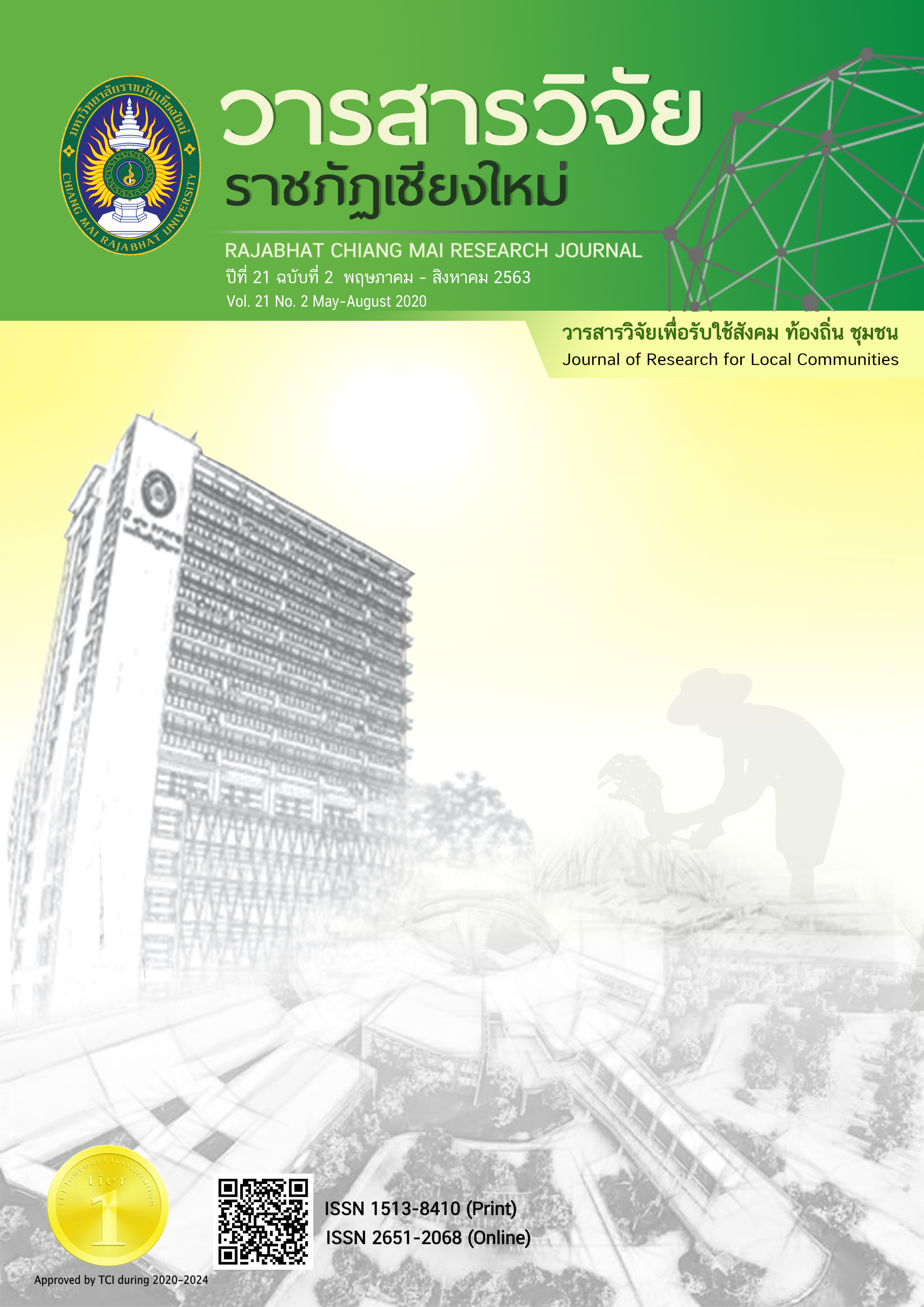Factors Affecting the Failure of Thai Education to Equip Thai Students with 21st Century Skills
DOI:
https://doi.org/10.14456/rcmrj.2020.225593Keywords:
Failure, Belief and culture, Learning achievement, EducationAbstract
This study investigated the factors affecting the failure of Thai education to equip Thai students with 21st century skills. Participants in the study were forty teachers and ten principals in primary and secondary schools with ICT infrastructure and computing facilities in Chiang Mai, Thailand. The data were obtained using both stratified random sampling as well as purposive sampling methods. Data were complied through interviews, questionnaires, and teaching observations during 2018 academic year. The quantitative data were analyzed by means of descriptive statistics while the qualitative data were analyzed by content analysis using Hyper Research Program. The findings illustrate that desired learners’ key competencies indicated in the basic Thai education core curriculum were effective and met 21st century education. However, those factors that could affect the failure of Thai education to equip Thai students with 21st century skills include: 1) no inclusive evidence that there is a close link between desired learners’ key competencies and policy implementers’ practices including school administrators and teachers, 2) teachers’ and principals’ lack of understanding regarding the curriculum’s expectations and goals, as well as innovative teaching approaches and 21st century education in general 3) teachers’ and principals’ perception of students being dependent learners, and the idea that innovative teaching methods did not suit the contexts. Interestingly, the findings reveal that the teachers’ cultures and beliefs had a correlation influencing their teaching practices.
Downloads
References
Fraillon, J., Ainley, J., Schulz, W., Friedman, T., & Gebhardt, E.. (2014). Preparing for Life in a Digital Age: The IEA International Computer and Information Literacy Study International Report. Germany: Springer International Publishing.
Hallinger, P., & Bryant, A.D. (2013): Synthesis of findings from 15 years of educational reform in Thailand: lessons on leading educational change in East Asia. International Journal of Leadership in Education. Retrieved from https://www.tandfonline.com/doi/abs/10.1080/13603124.2013
Haruthaithanasan, T. (2018). Effects of school policies toward competitive and collaborative approaches on teachers' instruction and students’ learning in schools in southern Thailand. Kasetsart Journal of Social Sciences. Retrieved from https://www.researchgate.net/publication/327125659
Levitt, K. E. (2001). An analysis of elementary teachers’ belief regarding the teaching science. Science Education, 86 (2), 1-22.
Ministry of Education. (2008). Basic education core curriculum B.E. 2551 (A.D. 2008). Retrieved from http://www.ipst.ac.th/
National Institute of Educational Testing Service. (NIETS). Basic statistic test result of O-NET: Grade 12 of academic year 2014-2017. Retrieved from https://www.niets.or.th/uploads/editor/files/Download/
OECD/UNESCO. (2016). Education in Thailand: An OECD-UNESCO perspective, reviews of national policies for education. Retrieved from http://dx.doi.org/10.1787/9789264259119-en
OECD. (2009). Creating effective and learning environments: First results from TALIS. Retrieved from https://www.oecd.org/berlin/43541655.pdf
Paladhi, S. (2017). 10 Factors that affect 21st century education’s longevity. EdTechReview. Retrieved from https://edtechreview.in/news/2849-factors-21st-century-education-technology
Richardson, V., Anders, P., Tidwell, D., & Lloyd, C. (1991). The relationship between teachers’ beliefs and practices in reading comprehension instruction. American Educational Research Journal, 28(3), 559-586.
Roehrig, G., & Kruse, R. (2005). The role of teachers’ beliefs and knowledge in the adoption of a reform- based curriculum. School Science and Mathematics, 105 (8), 412-422.
Sahlberg, P. (2007), Education policies for raising student learning: The Finnish approach. Journal of Education Policy, 22 (2), 147-171.
Tangkitvanich, S. (2013). Education system ills setting up future failure. TDRI Insight.
Tobin, K ., & Gallagher, J. (1987). What happens in high school science classroom?. Journal of Curriculum Studies, 19 (1), 549-560.
Tsai, C. C. (2002). Nested epistemologies: Science teachers’ beliefs of teaching, learning and science. International Journal of Science Education, 24 (8), 771-783.
Downloads
Published
How to Cite
Issue
Section
License
1. Articles, information, content, images, etc published in the “Community and Social Development Journal” are copyrighted by the Community and Social Development Journal, Chiang Mai Rajabhat University. In order to properly distribute the articles through print and electronic media, the authors still hold the copyright for the published articles under the Creative Commons Attribution (CC BY) license, which allows the re-distribution of the articles in other sources. References must be made to the articles in the journal. The authors are responsible for requesting permission to reproduce copyrighted content from other sources.
2. The content of the articles appearing in the journal is the direct responsibility of the article authors. The editorial board of the journal does not necessarily agree with or share any responsibility.














